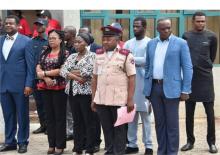Life is not a car part – Nigerians urged to be more cautious to prevent falling victim to road traffic accidents
Abuja, 26 November, 2019 - Nigerians are being reminded to be more careful on the road in order not to become victims of road traffic accidents.
According to the 2018 Global Status Report on Road Safety for Nigeria, the road traffic death rate per 100 000 Nigerians stood at 21.4, while the reported number of road traffic deaths stood at 35 641.
Speaking during a summit to commemorate the ‘World Day of Remembrance for Road Traffic Victims’ (observed third week of November annually), the Honourable Minister of Health, Dr Osagie Ehanire said “This year’s theme ‘life is not a car part’ could not have been more timely. Indeed, life is not a car part and cannot be replaced. Once it is gone, it cannot be given back.”
Dr Osagie added that “Although prevention is cheaper and a more pragmatic method of reducing road crashes, adequate emergency preparedness is required for victims of road crashes since some crashes will still occur no matter what is done.
Nigerians need to be more careful on the roads whether as drivers or pedestrians. As road users, the onus is on us to use cars with appropriate safety features, obey traffic rules and regulations, improve our behaviour while driving; no drinking and driving, no making of calls while driving and while crossing the road amongst others!”
The minister also disclosed that Government has launched an ‘Emergency Medical Treatment Committee’ as stipulated in the National Health Act, charged with the responsibility of providing prompt and quality emergency medical care to all Nigerians without recourse to their social status or ability to pay. This is with the use of 5% of the Basic Health Care Provision Fund. The committee is currently formalizing the operational structure of emergency medical service provision to all Nigerians.
The overall essence of the national road safety summit was to highlight the fact that as the initial phase of the Decade of Action for Road Safety and Traffic Injury Prevention draws to an end (2011-2020), there is a need to evaluate the gains made over the past 9 years and project areas that need to be strengthened in Nigeria. The objective was also to remind stakeholders of the need to meet the road safety targets set out in the Sustainable Development Goals strategy (SDG), which is based on a safe system approach and outlines 12 key actions spread across the five pillars of the decade which include: road safety management, safer vehicles, safer roads, safer road user behaviour and post-crash response.
Poor functional roads, bad vehicle maintenance culture and poor driving behaviour- major causes of road accidents in Nigeria
According to WHO some of the major causes of road accidents in Nigeria include; poor functional roads, bad vehicle/motor maintenance culture, poor driving behaviour, lack of proper driving education, driving under influence and over speeding, improperly planned road network, bad weather and human error, use of mobile devices and gadgets while driving, amongst others.
Speaking on behalf of the UN Resident and Humanitarian Coordinator, Mr. Edward Kallon, Dr Clement Peter of WHO Nigeria appreciated all stakeholders under the UN Decade of Action on Road Safety and Injury Prevention (UNDARSIP) for fostering a strong multisectoral collaboration on road safety in Nigeria.
Dr Peter stated, “Road traffic crashes may be an everyday occurrence but they are both predictable and preventable.”
He further called for “existing multisectoral coordination mechanism established through the UN Decade of action in Nigeria should be strengthened as concerted effort from all stakeholders are critical in addressing this menace. The UN community on its part, will continue to support the country’s continued concerted and drastic actions towards further reduction in road traffic related deaths and injuries in line with the 2020 UN Decade of Action and 2030 SDG 3.6 targets.”




